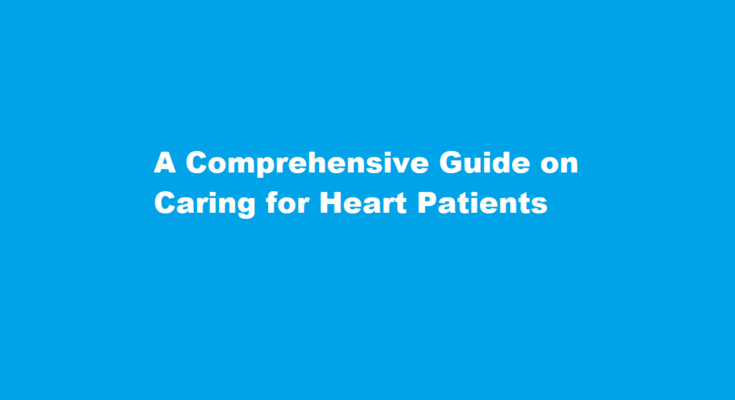Introduction
Heart disease remains a significant health concern, affecting millions of people worldwide. As a caregiver or a concerned family member, providing proper support and understanding to heart patients is essential for their well-being. Dealing with heart patients requires a delicate balance of compassion, knowledge, and practical care. In this article, we will explore essential tips and strategies to help you effectively manage the needs of heart patients and improve their quality of life.
Educate Yourself on Heart Disease
Understanding the specifics of the heart condition affecting your loved one is crucial. Educate yourself about the type of heart disease, the treatment plan, and possible complications. Consult with the healthcare professionals involved in their care to grasp the nuances of the condition, medications, and lifestyle modifications needed. Armed with this knowledge, you can offer better support and make informed decisions together.
Encourage a Heart-Healthy Diet
A well-balanced and heart-healthy diet plays a vital role in managing heart disease. Encourage the patient to consume foods low in saturated fats, cholesterol, and sodium. Opt for lean proteins, whole grains, fruits, and vegetables. Promote portion control and avoid sugary or processed foods. If necessary, consult a registered dietitian to create a personalized meal plan that fits the patient’s health needs and preferences.
Monitor Medications and Follow Medical Advice
Adherence to prescribed medications is critical for heart patients. Help them create a medication schedule and use pill organizers to avoid missing doses. Keep track of medication refills and attend regular doctor appointments. Additionally, ensure they understand the purpose of each medication and are aware of potential side effects or drug interactions.
Promote Regular Physical Activity
Physical activity is essential for maintaining heart health. Encourage the patient to engage in moderate exercises such as walking, swimming, or cycling, as recommended by their healthcare provider. Start with short sessions and gradually increase the duration and intensity. Regular physical activity helps improve cardiovascular function, manage weight, and reduce stress.
Manage Stress and Mental Health
Stress can negatively impact heart health. Support the patient in managing stress through relaxation techniques like deep breathing, meditation, or yoga. Encourage hobbies or activities they enjoy, as they can serve as effective stress-relievers. If the patient experiences anxiety or depression, seek professional help from a therapist or counselor specializing in heart patients.
Create a Heart-Healthy Environment
Maintain a heart-healthy environment at home by avoiding secondhand smoke and eliminating potential cardiovascular risks. Keep the living space clean and free from allergens, as they can exacerbate heart conditions. Ensure the home is well-ventilated and equipped with essential medical supplies, such as blood pressure monitors and emergency contact information.
Monitor Vital Signs Regularly
Monitoring vital signs like blood pressure, heart rate, and weight is crucial in managing heart patients. Keep a record of these measurements and report any significant changes to their healthcare provider promptly. Regular monitoring can help detect potential issues early and prevent complications.
Educate Family and Friends
Educating family members and friends about the patient’s condition is essential to provide a supportive network. This ensures everyone understands the necessary lifestyle adjustments and can offer the right kind of help and encouragement.
Encourage Smoking Cessation
If the patient is a smoker, encourage them to quit. Smoking is a major risk factor for heart disease and quitting can significantly improve heart health. Offer support and resources to help them through the process, such as smoking cessation programs or nicotine replacement therapies.
Be Attentive to Warning Signs
Familiarize yourself with the warning signs of potential heart problems. These may include chest pain, shortness of breath, dizziness, or extreme fatigue. If the patient experiences any of these symptoms, seek immediate medical attention.
FREQUENTLY ASKED QUESTIONS
How do you talk to a heart patient?
You can say: “I want you to live a long and healthy life.” “I want to help you make healthy changes so you can keep enjoying the things you love to do.” “I want to help you get healthy because I care about you.”
What heart patients can not eat?
Avoid cured and processed meats, which are high in sodium. Burgers and steaks, even unseasoned, present their own problem: they’re high in the types of fat that can lead to clogged arteries. Instead, aim to eat more fish than red meat, especially salmon, tuna, trout, and cod.
What activities should heart patients avoid?
Avoid too much isometric exercises such as pushups and situps. Isometric exercises involve straining muscles against other muscles or an immovable object. Don’t exercise outdoors when it is too cold, hot or humid without checking with your doctor first. High humidity may cause you to tire more quickly.
Conclusion
Caring for heart patients requires a multifaceted approach, incorporating lifestyle changes, emotional support, and vigilance. By educating yourself, promoting heart-healthy habits, and fostering a positive environment, you can significantly improve the patient’s overall well-being and contribute to their heart disease management. Remember, open communication and a compassionate attitude are essential in helping heart patients lead fulfilling lives despite their condition.
Read Also : Mastering The Art of Auscultation A Comprehensive Guide on How to Use a Stethoscope



